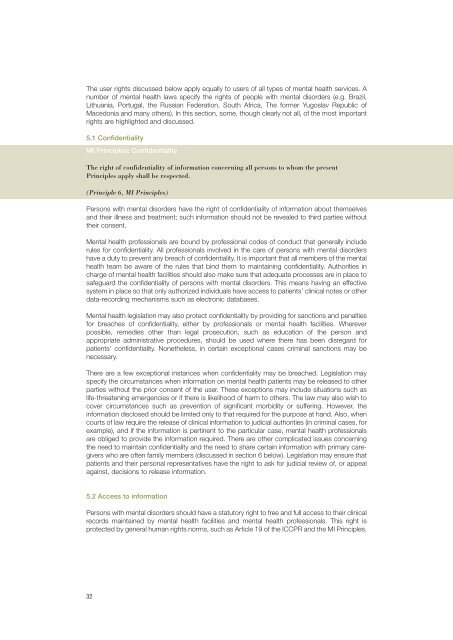human rights and legislation who resource book on mental health
human rights and legislation who resource book on mental health
human rights and legislation who resource book on mental health
You also want an ePaper? Increase the reach of your titles
YUMPU automatically turns print PDFs into web optimized ePapers that Google loves.
The user <str<strong>on</strong>g>rights</str<strong>on</strong>g> discussed below apply equally to users of all types of <strong>mental</strong> <strong>health</strong> services. A<br />
number of <strong>mental</strong> <strong>health</strong> laws specify the <str<strong>on</strong>g>rights</str<strong>on</strong>g> of people with <strong>mental</strong> disorders (e.g. Brazil,<br />
Lithuania, Portugal, the Russian Federati<strong>on</strong>, South Africa, The former Yugoslav Republic of<br />
Maced<strong>on</strong>ia <str<strong>on</strong>g>and</str<strong>on</strong>g> many others). In this secti<strong>on</strong>, some, though clearly not all, of the most important<br />
<str<strong>on</strong>g>rights</str<strong>on</strong>g> are highlighted <str<strong>on</strong>g>and</str<strong>on</strong>g> discussed.<br />
5.1 C<strong>on</strong>fidentiality<br />
MI Principles: C<strong>on</strong>fidentiality<br />
The right of c<strong>on</strong>fidentiality of informati<strong>on</strong> c<strong>on</strong>cerning all pers<strong>on</strong>s to <str<strong>on</strong>g>who</str<strong>on</strong>g>m the present<br />
Principles apply shall be respected.<br />
(Principle 6, MI Principles)<br />
Pers<strong>on</strong>s with <strong>mental</strong> disorders have the right of c<strong>on</strong>fidentiality of informati<strong>on</strong> about themselves<br />
<str<strong>on</strong>g>and</str<strong>on</strong>g> their illness <str<strong>on</strong>g>and</str<strong>on</strong>g> treatment; such informati<strong>on</strong> should not be revealed to third parties without<br />
their c<strong>on</strong>sent.<br />
Mental <strong>health</strong> professi<strong>on</strong>als are bound by professi<strong>on</strong>al codes of c<strong>on</strong>duct that generally include<br />
rules for c<strong>on</strong>fidentiality. All professi<strong>on</strong>als involved in the care of pers<strong>on</strong>s with <strong>mental</strong> disorders<br />
have a duty to prevent any breach of c<strong>on</strong>fidentiality. It is important that all members of the <strong>mental</strong><br />
<strong>health</strong> team be aware of the rules that bind them to maintaining c<strong>on</strong>fidentiality. Authorities in<br />
charge of <strong>mental</strong> <strong>health</strong> facilities should also make sure that adequate processes are in place to<br />
safeguard the c<strong>on</strong>fidentiality of pers<strong>on</strong>s with <strong>mental</strong> disorders. This means having an effective<br />
system in place so that <strong>on</strong>ly authorized individuals have access to patients’ clinical notes or other<br />
data-recording mechanisms such as electr<strong>on</strong>ic databases.<br />
Mental <strong>health</strong> <str<strong>on</strong>g>legislati<strong>on</strong></str<strong>on</strong>g> may also protect c<strong>on</strong>fidentiality by providing for sancti<strong>on</strong>s <str<strong>on</strong>g>and</str<strong>on</strong>g> penalties<br />
for breaches of c<strong>on</strong>fidentiality, either by professi<strong>on</strong>als or <strong>mental</strong> <strong>health</strong> facilities. Wherever<br />
possible, remedies other than legal prosecuti<strong>on</strong>, such as educati<strong>on</strong> of the pers<strong>on</strong> <str<strong>on</strong>g>and</str<strong>on</strong>g><br />
appropriate administrative procedures, should be used where there has been disregard for<br />
patients’ c<strong>on</strong>fidentiality. N<strong>on</strong>etheless, in certain excepti<strong>on</strong>al cases criminal sancti<strong>on</strong>s may be<br />
necessary.<br />
There are a few excepti<strong>on</strong>al instances when c<strong>on</strong>fidentiality may be breached. Legislati<strong>on</strong> may<br />
specify the circumstances when informati<strong>on</strong> <strong>on</strong> <strong>mental</strong> <strong>health</strong> patients may be released to other<br />
parties without the prior c<strong>on</strong>sent of the user. These excepti<strong>on</strong>s may include situati<strong>on</strong>s such as<br />
life-threatening emergencies or if there is likelihood of harm to others. The law may also wish to<br />
cover circumstances such as preventi<strong>on</strong> of significant morbidity or suffering. However, the<br />
informati<strong>on</strong> disclosed should be limited <strong>on</strong>ly to that required for the purpose at h<str<strong>on</strong>g>and</str<strong>on</strong>g>. Also, when<br />
courts of law require the release of clinical informati<strong>on</strong> to judicial authorities (in criminal cases, for<br />
example), <str<strong>on</strong>g>and</str<strong>on</strong>g> if the informati<strong>on</strong> is pertinent to the particular case, <strong>mental</strong> <strong>health</strong> professi<strong>on</strong>als<br />
are obliged to provide the informati<strong>on</strong> required. There are other complicated issues c<strong>on</strong>cerning<br />
the need to maintain c<strong>on</strong>fidentiality <str<strong>on</strong>g>and</str<strong>on</strong>g> the need to share certain informati<strong>on</strong> with primary caregivers<br />
<str<strong>on</strong>g>who</str<strong>on</strong>g> are often family members (discussed in secti<strong>on</strong> 6 below). Legislati<strong>on</strong> may ensure that<br />
patients <str<strong>on</strong>g>and</str<strong>on</strong>g> their pers<strong>on</strong>al representatives have the right to ask for judicial review of, or appeal<br />
against, decisi<strong>on</strong>s to release informati<strong>on</strong>.<br />
5.2 Access to informati<strong>on</strong><br />
Pers<strong>on</strong>s with <strong>mental</strong> disorders should have a statutory right to free <str<strong>on</strong>g>and</str<strong>on</strong>g> full access to their clinical<br />
records maintained by <strong>mental</strong> <strong>health</strong> facilities <str<strong>on</strong>g>and</str<strong>on</strong>g> <strong>mental</strong> <strong>health</strong> professi<strong>on</strong>als. This right is<br />
protected by general <str<strong>on</strong>g>human</str<strong>on</strong>g> <str<strong>on</strong>g>rights</str<strong>on</strong>g> norms, such as Article 19 of the ICCPR <str<strong>on</strong>g>and</str<strong>on</strong>g> the MI Principles.<br />
32

















